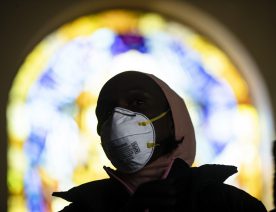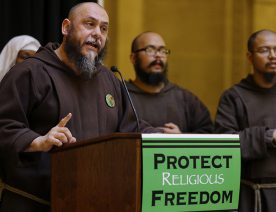
Just about half of Americans report regularly attending a religious congregation. With most of those congregations currently closed, some are replacing in-person services with private prayer and live-streaming services.
Forty-eight percent of Americans have a regular congregation and only 7% have a congregation currently open. Of those with a religious affiliation, 58% have a regular congregation and 7% have a congregation that is currently open. As a result, fewer Americans are attending in-person religious services and more are watching live-streaming religious services online.
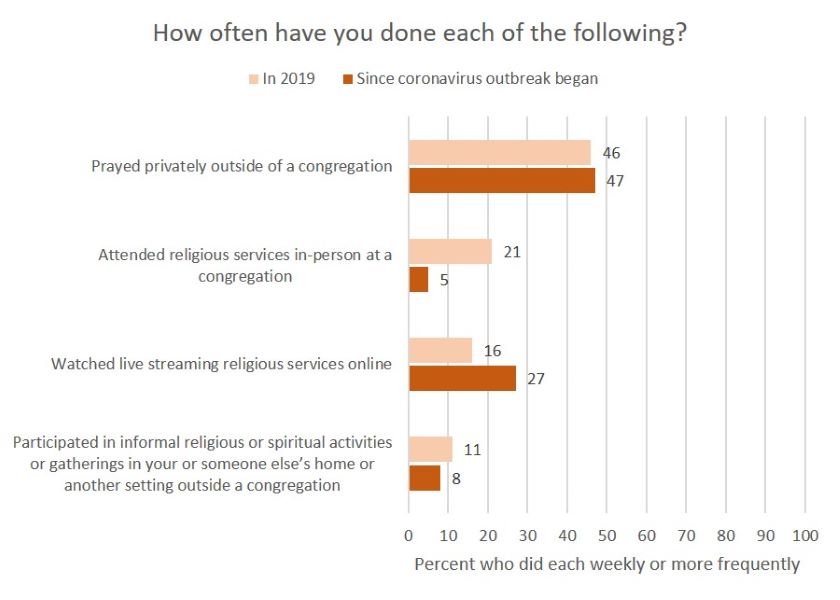
Questions: In 2019, how often, if at all, did you do each of the following? / Since the coronavirus outbreak began in the U.S., how often have you done each of the following?
Source: UChicago Divinity School/AP-NORC Poll conducted April 30-May 4, 2020 with 1,002 adults nationwide.
Those with a religious affiliation show similar changes in behavior. More are watching live-streaming services weekly (33% now vs.19% before). Fewer are attending in-person services (7% now vs. 27% before). Similar numbers are privately praying (56% now vs. 56% before) and participating in informal services (10% now vs. 14% before).
Some are seeking out other ways of practicing their faith. Participation in an online religious or spiritual group activity and talking on the phone or video conference with a religious or spiritual leader are more common than attending drive-thru services or other religious activities.

Questions: Since the coronavirus outbreak began in the U.S., how often did you do each of the following?
Source: UChicago Divinity School/AP-NORC Poll conducted April 30-May 4, 2020 with 1,002 adults nationwide.
Those with a religious affiliation are participating in these activities at similar rates. Since the outbreak began, 38% have participated in an online prayer or other group activity, 30% have spoken with a religious or spiritual leader by phone or video, and some have attended a drive through religious service (10%), or another drive-thru religious activity (9%).
Fifty-one percent of Americans think in-person religious services should be allowed in some form, though only 9% think services should be allowed without any restrictions. More say drive-thru services should be allowed in some form. By comparison, 76% say people should be allowed to visit outdoor spaces like parks or beaches at least in some form, and 49% say the same about a protest, rally, or march in public.
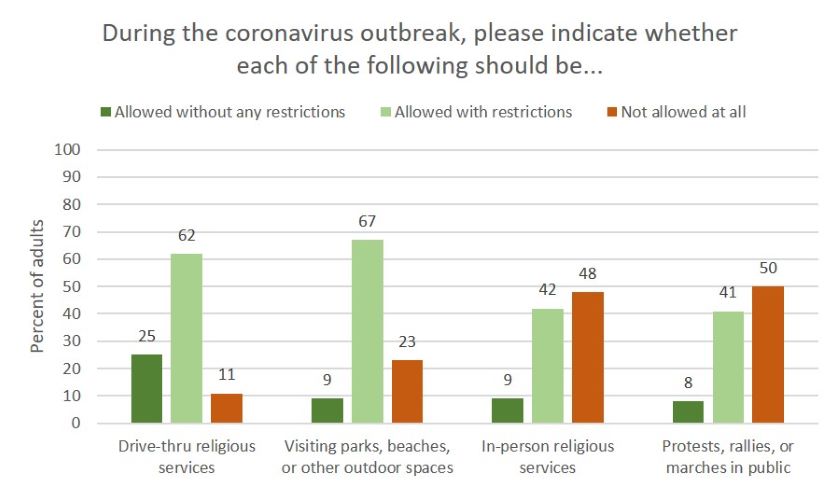
Question: During the coronavirus outbreak, please indicate whether each of the following should be allowed without any restrictions, allowed but with restrictions on crowd size or physical distancing, or not allowed at all in the United States: [ITEM]
Source: UChicago Divinity School/AP-NORC Poll conducted April 30-May 4, 2020 with 1,002 adults nationwide.
Those with a religious affiliation are more likely than those without a religious affiliation to say in-person religious services should be allowed without restriction (10% vs. 3%), while those who do not have a religious affiliation are more likely to say they should not be allowed at all (57% vs. 45%). But, these groups do not differ in their attitudes on whether drive-thru religious services, visiting outdoor spaces, or protests and rallies should be allowed.
Democrats and independents are more skeptical than Republicans of opening up each of these things to the public without restrictions during the outbreak.

Question: During the coronavirus outbreak, please indicate whether each of the following should be allowed without any restrictions, allowed but with restrictions on crowd size or physical distancing, or not allowed at all in the United States: [ITEM]
Source: UChicago Divinity School/AP-NORC Poll conducted April 30-May 4, 2020 with 1,002 adults nationwide.
A minority believe the restrictions on religious activities designed to slow the spread of the virus violate freedom of religion. However, people are more likely to view complete prohibition of services to be a violation than services with restrictions.
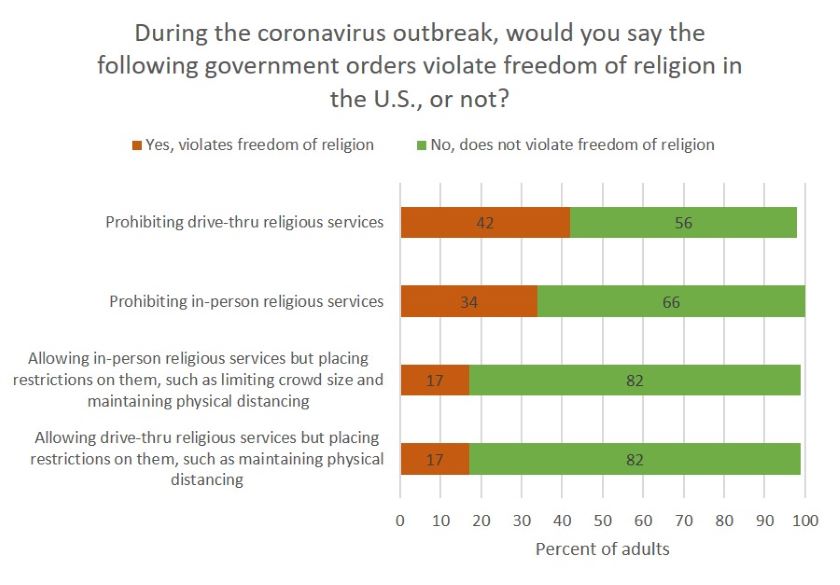
Question: During the coronavirus outbreak, would you say the following government orders violate freedom of religion in the United States, or not?
Source: UChicago Divinity School/AP-NORC Poll conducted April 30-May 4, 2020 with 1,002 adults nationwide.
Those with a religious affiliation are more likely than those without one to say that prohibiting in-person religious services (36% vs. 24%) and putting restrictions on in-person services (20% vs. 9%) violate freedom of religion, even when accounting for other demographic factors like partisanship. Still though, fewer than half of those with a religious affiliation consider any of these restrictions a violation of religious freedom.
Republicans are more likely than Democrats to say all of these restrictions are violations of freedom of religion. More than half of Republicans (59%) say prohibiting drive-thru religious services is a violation.
Fifty-five percent disapprove of the protests of stay at home orders that have taken place in some states in the U.S., while 31% approve and 14% neither approve nor disapprove. There are no differences by political party or religiosity.
Overall, 47% of Americans are very or extremely worried that they or someone in their family will be infected with the coronavirus, a number that has increased since February and early March. Eighteen percent are worried about being infected with the flu.
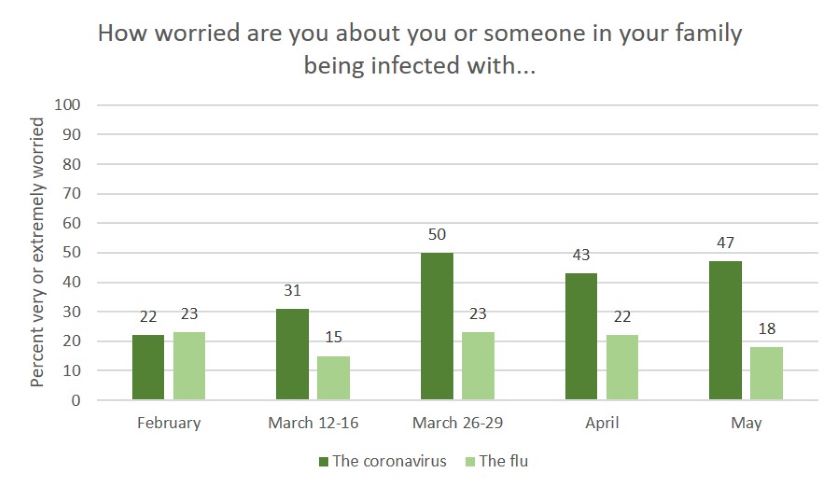
Question: How worried are you about you or someone in your family being infected with…[ITEM]
Source: AP-NORC Polls conducted February 13-16, 2020 with 1,074 adults, March 12-16, 2020 with 1,003 adults, March 26-29, 2020 with 1,057 adults, April 16-20, 2020 with 1,057 adults, and April 30-May 4, 2020 with 1,002 adults nationwide.
While nearly half the public is very or extremely worried about infection, even more are taking steps to limit their exposure to, and slow the spread of, the virus. Large majorities are limiting trips outside the house, keeping a 6-foot radius when interacting with others, limiting their interactions with others to groups or 10 or less, avoiding other people as much as possible, and wearing a mask when leaving the home.
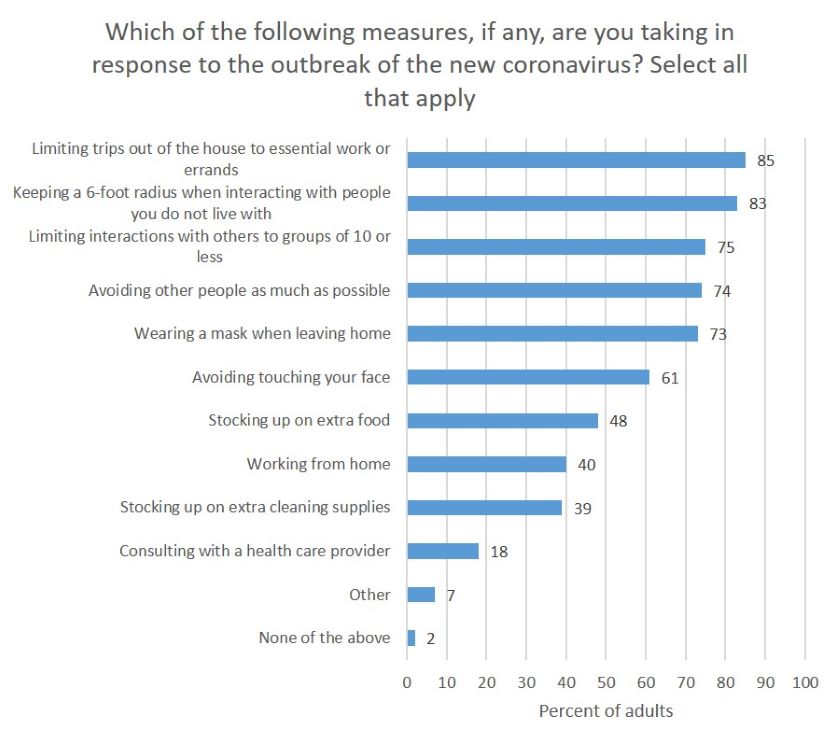
Questions: Which of the following measures, if any, are you taking in response to the outbreak of the new coronavirus?
Source: UChicago Divinity School/AP-NORC Poll conducted April 30-May 4, 2020 with 1,002 adults nationwide.
Many remain in favor of measures put in place in response to the coronavirus outbreak, but support has declined since April. Notably, though 71% support requiring Americans to stay at home except for essential errands, more (85%) are practicing this behavior anyway.

Question: In response to the coronavirus outbreak, do you favor, oppose, or neither favor nor oppose each of the following?
Source: AP-NORC Polls conducted March 26-29, 2020 with 1,057 adults, April 16-20, 2020 with 1,057 adults, and April 30-May 4, 2020 with 1,002 adults nationwide.
The nationwide poll was conducted April 30-May 4, 2020, using the AmeriSpeak® Panel, the probability-based panel of NORC at the University of Chicago. Online and telephone interviews using landlines and cell phones were conducted with 1,002 adults. The margin of sampling error is plus or minus 4.2 percentage points.


